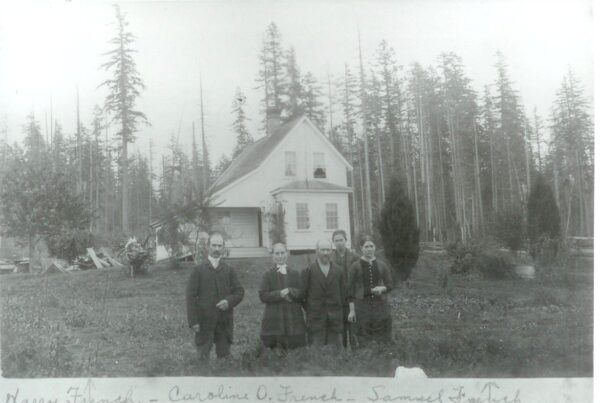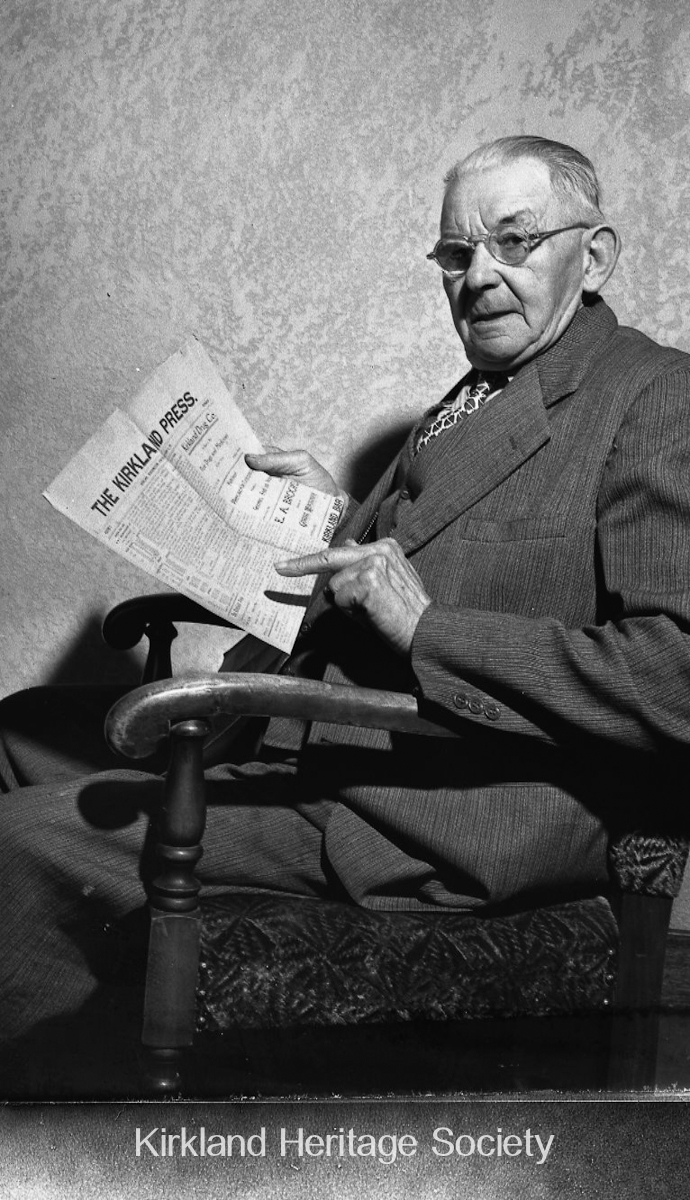A man who knew Kirkland when roads were little more than cow trails and nearly very lot bristled with “for sale” signs has little trouble remembering the “good ol’ days”, even though he will be 97 in December.
The name of George Gardner is familiar to hundreds of local people, those who went to Central School during the 18 years Gardner was custodian there. And he still remembers the farewell party they gave him when he retired, he said this week in his home.
Gardner and his wife, Ore, moved their belongings here from Port Townsend in 1918. Times were slim in those days, and property could be had by merely paying the taxes. The Gardner’s settled on a lot on Kirkland Ave. across from where the power station is today. They built a comfortable home, and settled down to witness Kirkland’s growth and progress during 36 years. “Most of the land was burnt and stumped long after we moved here,” Gardner recalled as he and his wife searched their memories.
Farm Near Town
“A large family of Japanese truck gardeners leased the property, where the Kirkland Hospital is now, from Burke and Farrar. Even the women cleared the land. They would saw down trees as fast as anyone with their cross cut saws. And believe me, could they raise the strawberries and lettuce!” Gardner exclaimed. Mrs. Gardner doesn’t’ leave her home as often as she used to, but she is still a remarkable woman. The couple celebrated their 60th wedding anniversary on April 18, 1953.
“Remember when they had the horse racing in the pasture across the road?” she said to her husband.
“Folks got together every weekend then,” she recalled, “and everybody knew all their neighbors.”
“Why, only a few years ago, we knew everyone in town. Now we hardly know anyone; so many people moving in.”
The Gardners raised three boys and three girls. Their son, George, lives on the other side of the block. Their other children live in the Northwest and Alaska. They met in Kansas in the ’80’s. Gardner worked on the Santa Fe Railway as it stretched westward in the days of the great buffalo slaughters. “We used to drive along and see huge piles of drying buffalo bones, where hundreds of them had been shot for their hides. There wasn’t a home without a buffalo robe in those days,” he said.
Come From England
Gardner came to the United States from England. He was born in Stratford-on-Avon, the birthplace of the Great Bard, William Shakespeare.”See that picture hanging there; take it down for a good look — that’s the house where I was born, and it probably looks just the same today, hatched roof and all,” he chuckled.”Say, .mother, where is that history book?” he asked his wife.
Mrs. Gardner reached into a bookshelf bulging with albums, pictures and a large family Bible, and pulled out an American history book which would probably be considered antique by modern educators.
“That history book has got good stuff in it.” he explained. It belonged to George Bartsch, who was in the first Kirkland High school graduating class in 1889.”An inscription on the book’s flyleaf written with a flourish in script of the variety taught in public schools 50 years ago said, “Master George Bartsch, November 18. 1889, Kirkland, Washington.” Bartsch’s sister. Mrs. Agnes Munson, is Claude Elwood’s mother, he of Red and White Grocery fame.
Good Life Here
“We’ve had a good life here in Kirkland.” Gardner said, and Mrs. Gardner nodded in agreement. “People do a lot of growling about the high co*t of living, but I think they have it pretty good. “Why, Mother’s Dad went all through the Civil War. Late in his life, when he began drawing a pension, for three years he got $8 a month. Later, it was raised to $10. And when he was about ready to pass in his checks, he was getting $12.50 a month.”
“Folks never had it so good as they do today,” he grinned. Mr. Gardner is not content to sit in his rocking chair and comment on the failings of the current generation, however. The sun doesn’t set on a day that he hasn’t chopped a pile of cordwood, weeded a row of corn in his large garden, or spaded the flower beds around his neat home.
By JOAN JACOBSEN



